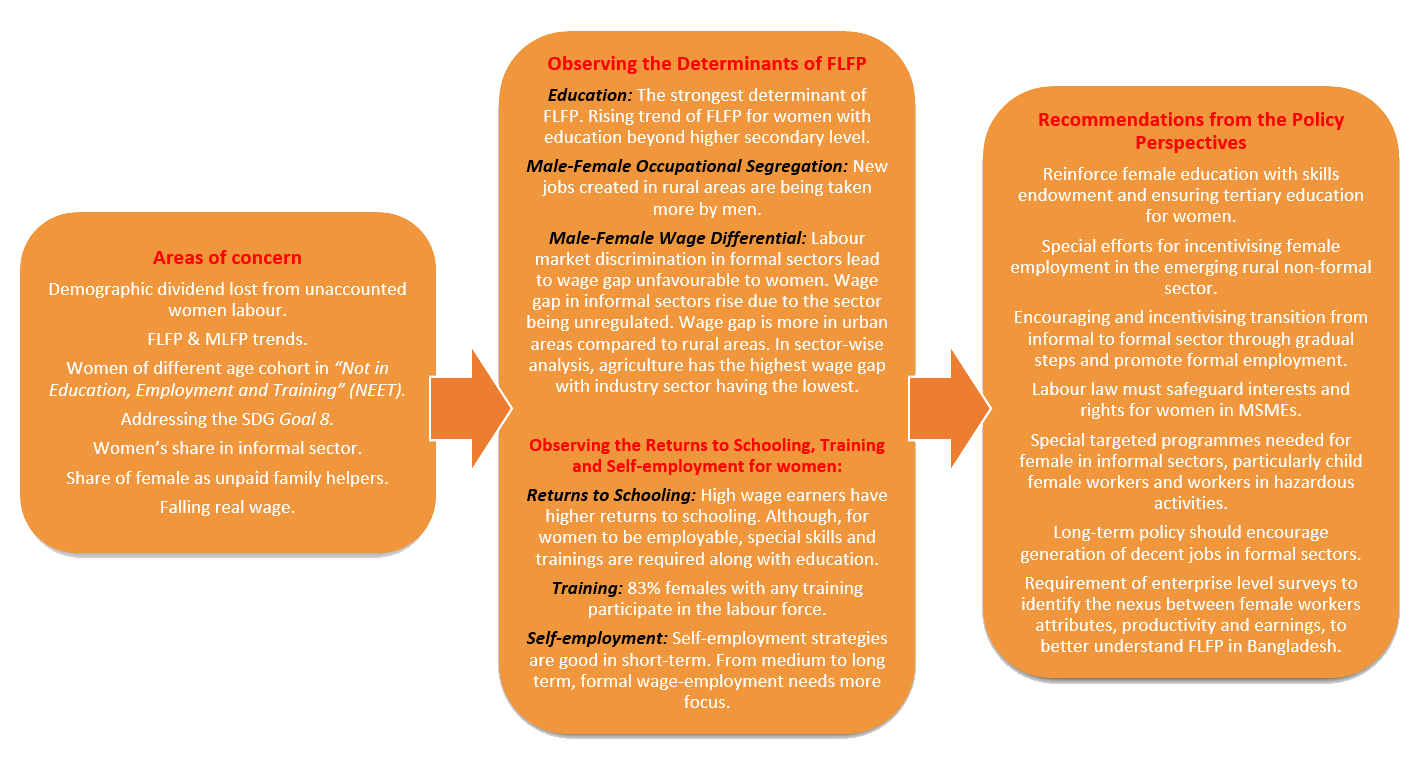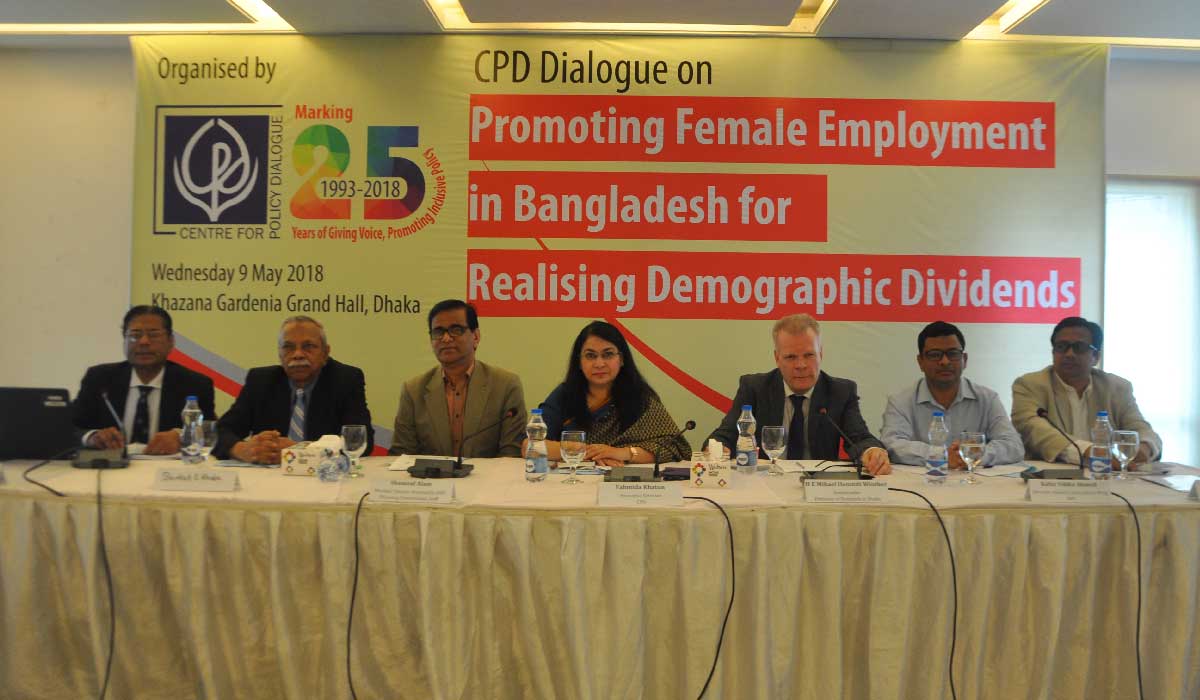
Presentation | Policy Note | Video | Photos | Press Clips
Due to achieving lower mortality and fertility rate, Bangladesh has a working-age-population larger than the non-working-age population, which indicates a potential economic growth, i.e. demographic dividend. Bangladesh will be able to get the benefit of the demographic dividend over the next four decades if women are adequately employed.
The CPD study, “Promoting Female Employment in Bangladesh for Realising Demographic Dividends”, finds that only 36.3% women are in the participating labour force. This is markedly lower compared to the countries with the similar economic condition. The study suggests skills-endowed education for women is critically important to realise the demographic dividends for Bangladesh. The study was presented in a dialogue titled “Realising the Demographic Dividend in Bangladesh: Promoting Female Labour Force Participation” and was held at Khazana Gardenia Grand Hall, Dhaka on 9 May 2018.
Professor Mustafizur Rahman, Distinguished Fellow, CPD, made the keynote presentation. The study was conducted by the CPD in collaboration with Embassy of Denmark. Dr Fahmida Khatun, Executive Director, CPD, chaired the event. Dr Shamsul Alam, Member (Senior Secretary), General Economics Division Planning Commission, Government of Bangladesh was the Chief Guest and H E Mr Mikael Hemniti Winther, Ambassador, Embassy of Denmark in Dhaka was the Guest of Honour at the event. Following the presentation, a discussion by the Distinguished Discussant on the topic was held with Dr Barkat-E-Khuda, Dr Muzaffar Ahmad Chair Professor, Bangladesh Institute of Bank Management (BIBM); Mr Kabir Uddin Ahmed, Director, Industry and Labour Wing, Bangladesh Bureau of Statistics (BBS); and Dr Minhaj Mahmud, Senior Research Fellow, Bangladesh Institute of Development Studies (BIDS).
Overview of the Study
By examining the constraints and challenges in the job market, the study has offered a number of policy recommendations and especially emphasised on SDG aligned policy to achieve inclusive development.
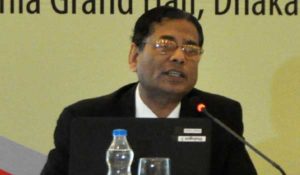 Half of the wage gap is caused by gender discrimination, stated Professor Rahman. He described this situation as a glass ceiling which needs to be broken. The study finds a strong correlation between women’s education and employment. Women with no education, work in informal sectors with low payments. The participation of women in primary and secondary education is low and with tertiary education, the participation rate has an upward trend in payments. Thus, more investment in education is required, which is currently not reflected in the national budget. Education supplemented with vocational training was especially emphasised. The training needs to be planned according to emerging market demands.
Half of the wage gap is caused by gender discrimination, stated Professor Rahman. He described this situation as a glass ceiling which needs to be broken. The study finds a strong correlation between women’s education and employment. Women with no education, work in informal sectors with low payments. The participation of women in primary and secondary education is low and with tertiary education, the participation rate has an upward trend in payments. Thus, more investment in education is required, which is currently not reflected in the national budget. Education supplemented with vocational training was especially emphasised. The training needs to be planned according to emerging market demands.
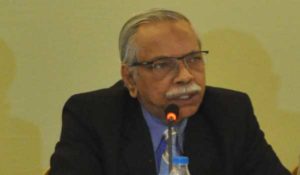 The discussion following the presentation urged for a comprehensive understanding of the issue from social and economic perspectives. The prevailing social practice of early childhood marriage keeps young women away from the labour market, education and training, said Dr Barkat-E-Khuda.
The discussion following the presentation urged for a comprehensive understanding of the issue from social and economic perspectives. The prevailing social practice of early childhood marriage keeps young women away from the labour market, education and training, said Dr Barkat-E-Khuda.
The study and the floor-discussion emphasised on women’s access to the decent job as suggested in the SDG target 8.5. The decent job will ensure healthy work-environment confirming safety and security for women while rationally considering maternity related issues and women’s need for coordinating between work and home.
Acknowledging the merit of the study, Dr Shamsul Alam said, such studies would be helpful for the government in formulating the 8th five-year plan and the Vision 2041.
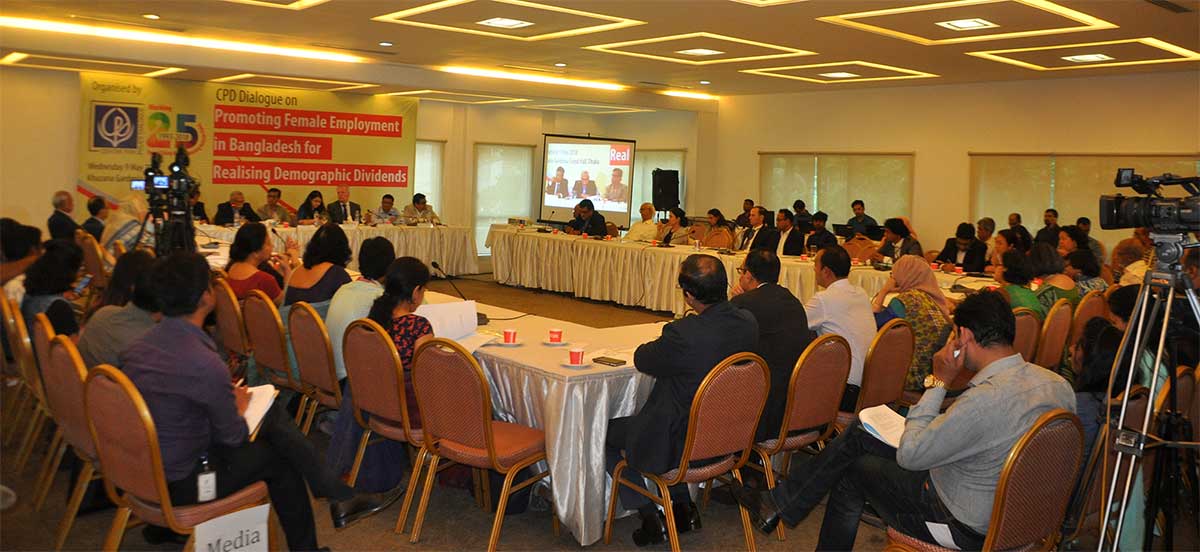
[pdf-embedder url=”http://cpd.org.bd/resources/2018/05/Presentation-Realising-the-Demographic-Dividend-in-Bangladesh-Promoting-Female-Labour-Force-Participation.pdf” title=”Presentation-Realising the Demographic Dividend in Bangladesh-Promoting Female Labour Force Participation”]



